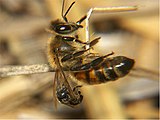Austroplebeia australis
| Austroplebeia australis | |
|---|---|

| |
| Female worker | |

| |
| Male drone | |
| Scientific classification | |
| Domain: | Eukaryota |
| Kingdom: | Animalia |
| Phylum: | Arthropoda |
| Class: | Insecta |
| Order: | Hymenoptera |
| Family: | Apidae |
| Clade: | Corbiculata |
| Tribe: | Meliponini |
| Genus: | Austroplebeia |
| Species: | A. australis
|
| Binomial name | |
| Austroplebeia australis Friese, 1898
| |
| Synonyms[1] | |
| |
Austroplebeia australis (previously and originally known as Trigona australis[2][3]) is a stingless bee species in the tribe Meliponini first validly described by Heinrich Friese in 1898.[4] Within Australia, they are occasionally referred to as bush bees.
The native range of A. australis extends more than 2,000 km, from the districts of Fitzroy and Central West Queensland, through the Darling Downs and into northern New South Wales, but is thought to be no further south than 31°04'S (Example: Hat Head National Park).[5]
Colony cycle
Activity
Colonies of A. australis tend to be active all year round[6]. The daily activity period, however, is longer in the Southern Hemisphere's warmer months, late September to March.[6] The intensity of these daily flights is greatest in September, and least intense in May. A temperature threshold exists on all of this activity. Flight and foraging activity is not observed until an ambient temperature rise of greater than 20 °C.[6] This year-long period of activity is beneficial for the pollination of crops flowering at any time of the year.
Interaction with other species
Predators
The typical predators for A. australis include many of the same predators for other Meliponini species, such as birds, lizards, spiders, and mammals.[7]
Defence
Devoid the use of a stinger, the main defence for a stingless bee colony is the entrance. The entrance of the nest are reduced in size to the width of three to four bees wide.[8] Most species within the Austroplebeia genus close their entrance at night with a sticky resinous substance. At dusk A. australis constructs a lacy curtain of cerumen at the entrance of the nest[8] to aid in defence but this is also observed during inclement weather. The curtain is taken down each morning when the temperature starts to rise and stored for later reuse.[8]
African small hive beetle
In a 2007 study by Megan Halcroft, A. australis successfully demonstrated its capability to defend against invasive African small hive beetles (Aethina tumida) that were intentionally introduced into the nest.[9] The study showed that all introduced African small hive beetle eggs were eaten by the workers or destroyed by them within 24 hours, with 96% of the eggs consumed or destroyed within the first 90 minutes.[9] Similarly introduced small hive beetle larvae were also removed, and adult small hive beetle were also removed or rendered entirely incapacitated by entombment in resin.[9] It was concluded that healthy, strong colonies of A. australis that kept in undamaged hives and maintained which are faced with the African small hive beetles normal hive invasion mechanism, entering through the hive entrance, are more than capable to defend themselves.[9] The defensive behaviour of A. australis is at an advantage with that compared to the European honey bee (Apis mellifera) against the African small hive beetle.[10]
Photo Gallery
-
Female worker
-
Male drone
-
An Austroplebeia australis stingless bee defending against Apis mellifera
-
Female worker dorsal view
-
Male drone dorsal view
References
- ^ Halcroft, MT; Dollin, A; Francoy, TM; King, JE; Riegler, M; Haigh, AM; Spooner-Hart, RN (2015-07-23) [2016]. "Delimiting the species within the genus Austroplebeia, an Australian stingless bee, using multiple methodologies". Apidologie. 47 (1): 76–89. doi:10.1007/s13592-015-0377-7. eISSN 1297-9678. ISSN 0044-8435.
{{cite journal}}: CS1 maint: date and year (link) - ^ Friese, H (1898). "Die Trigona-arten Australiens". Termeszetrajzi Fuzetek (in German). 21: 430. LCCN 16021780. OCLC 1767299.
- ^ "IRMNG Trigona australis Friese, 1898". www.irmng.org. Retrieved 2020-02-10.
- ^ "ITIS Standard Report Page: Austroplebeia australis Friese, 1898". www.itis.gov. Retrieved 2020-02-10.
- ^ Halcroft, M.T. (2012). Investigations into the Biology, Behaviour and Phylogeny of a Potential Crop Pollinator: The Australian Stingless Bee, Austroplebeia australis (PhD). University of Western Sydney. OCLC 829791221.
{{cite thesis}}: CS1 maint: date and year (link) - ^ a b c Halcroft, M.T.; Haigh, A.M.; Holmes, S.P.; Spooner-Hart, R.N. (2013-09-11). "The thermal environment of nests of the Australian stingless bee, Austroplebeia australis" (PDF). Insectes Sociaux. 60 (4): 497–506. doi:10.1007/s00040-013-0316-4. eISSN 1420-9098. ISSN 0020-1812.
{{cite journal}}: CS1 maint: date and year (link)ResearchGate Publication 256537334 - ^ Hilário, S.D.; Imperatriz-Fonseca, V.L. (2003). "Thermal Evidence of the Invasion of a Stingless Bee Nest by a Mammal" (PDF). Brazilian Journal of Biology. 63 (3): 457–462. doi:10.1590/s1519-69842003000300011. eISSN 1678-4375. ISSN 1519-6984. PMID 14758704.
- ^ a b c Dollin, Anne (1996). Nests of Australian Stingless Bees (booklet). Native bees of Australia series. Vol. 2 (1st ed.). North Richmond: Australian Native Bee Research Centre. pp. 1–14. ISBN 978-1-876307-01-1.
{{cite book}}: CS1 maint: date and year (link) - ^ a b c d Halcroft, M.T. (2007). Investigations on the behaviour of the Australian native bee, Austroplebeia australis, with particular reference to its defence strategies against the African small hive beetle, Aethina tumida (PDF) (BSc). University of Western Sydney.
{{cite thesis}}: CS1 maint: date and year (link)ResearchGate Publication 235903061 - ^ Halcroft, M.; Spooner-Hart, R.; Neumann, P. (2011-05-01). "Behavioral defense strategies of the stingless bee, Austroplebeia australis, against the small hive beetle, Aethina tumida" (PDF). Insectes Sociaux. 58 (2) (published 2011): 245–253. doi:10.1007/s00040-010-0142-x. eISSN 1420-9098. ISSN 0020-1812.
{{cite journal}}: CS1 maint: date and year (link)ResearchGate Publication 226918843 - ^ Velthuis, H.H.W.; Koedam, D.; Imperatriz-Fonseca, V.L. (2005). "The males of Melipona and other stingless bees, and their mothers" (PDF). Apidologie. 36 (2): 169–185. doi:10.1051/apido:2005014. eISSN 1297-9678. ISSN 0044-8435.
{{cite journal}}: CS1 maint: date and year (link)ResearchGate Publication 44021577
External links





